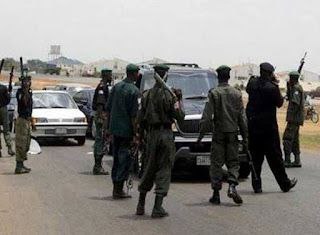A Federal High Court sitting in Lagos has dismissed a suit filed by former Chairman of Nigerian Bar Association, Section on Public Interest and Development Law, NBA-SPIDEL, Dr Monday Ubani seeking to stop the army, police and other security agencies from proliferating the Lagos-Southeast routes with roadblocks.
Ubani had dragged the Attorney-General of the Federation, Inspector-General of Police, Comptroller General of Customs, Chief of Defence Staff, Corp Marshal of the Federal Road Safety Corp before the court seeking a declaration that the proliferation of intra-state and highways with road blocks mounted by their officers particularly enroute Lagos to South-eastern part of Nigeria which result in obstruction of free movement in the highway and loss of travel time is a violation of his right to free and undisrupted movement as guaranteed by section 41 of the 1999 Constitution and other enabling laws.
Also joined in the suit as co-respondents are; the Police Force, Nigeria Customs Service Board, Nigerian Army and Federal Road Safety Commission.
Other prayers by Ubani include a declaration that the proliferation of intra-state and highway roadblocks particularly enroute Lagos to South Eastern part of Nigeria, obstructs free flow of traffic, constitute nuisance, causes untold hardship and unwarranted suffering to him and other road users and therefore unlawful and without legal justification.
He also prayed for an order directing the respondents forthwith to dismantle all roadblocks on all intra-state roads and highways throughout the country and particularly along the South-East roads.
Ubani also sought an order of perpetual injunction restraining the respondents, their privies, agents and representatives from mounting intra-state and highway road blocks on Lagos en route South Eastern roads.
On his ground for seeking the injunctions, Ubani narrated an incident in 2021 when he travelled from Lagos to his home town in Abia state with his family by road and spent about 15 hours along the road due to over 120 roadblocks mounted by officers of the respondents who also subjected other roads users to untold hardship, extortion intimidation and harassments.
In their separate responses to the suit, the Police, Army, Customs and Road Safety Corp admitted mounting roadblocks along the Lagos to South-Eastern route but insisted that they were empowered by enabling laws to do so as part of their responsibilities to secure the country and check crime.
They also insisted that the right of freedom of movement as enshrined in the 1999 constitution is not absolute and maintained that the proliferation of roadblocks along the South-Eastern roads did not in any way infringe on the right of the applicant.
Delivering judgment in the suit, Justice Chukwujekwu Aneke held that from evidence before him, it was obvious that indeed there were proliferation of roadblocks along the Lagos-South Eastern road which made the applicant and other users to spend hours on the road.
The court further held that the right to free movement of the applicant was indeed derogated upon due to the powers of the constitution given to the President and the security agencies to map out security measures to secure the country.
However the court failed to address the issue raised by Ubani on why the security measures said to be securing the country are only meant for roads leading to the Eastern region and minimal on other routes in the country.
The judgment reads in part. ” All the 2nd to 9th Respondents when they are on the Nigerian Roads, whether intrastate roads, interstate roads or Highways are there to prevent crime. They provide internal security which is the main function of the 3rd Respondent. They therefore perform police duties. In fact, the 4th and 5th Respondents were statutorily given the powers of the Police when carrying out their functions.
These Police powers especially to stop, search, arrest and prosecute any person committing an offence was also given to the Respondent.
“There is no way the 9th Respondent can perform its duties without stopping and sometimes searching vehicles. I therefore hold that the road blocks mounted by the 2nd to 9th Respondents which clearly restrict the right to freedom of movement of the Applicant and other road users does not by that reason alone violate the Applicant’s fundamental rights.
“This does not mean that any illegal act committed by the 2nd to 9th Respondents while on the intra-state roads and highways, whether they mounted road blocks or not, cannot be investigated and prosecuted in the law courts according to the laws of Nigeria.
“It is for the reasons given above that I hereby dismiss the application for the enforcement of fundamental rights brought by the Applicant.”
Reacting to the judgement, Ubani said he would appeal the judgement or go back to the court with modification of his reliefs as he believes that the reason for the unnecessary proliferation of the road blocks on the Eastern route is not for security measures.
He maintained that it has become obvious by evidence on ground that that the proliferation of the road blocks is purely and simply for extortion and inconvenience purposes.




